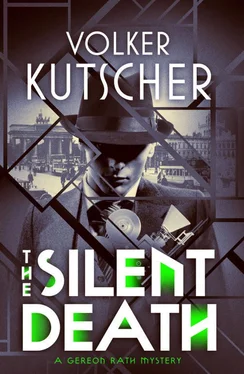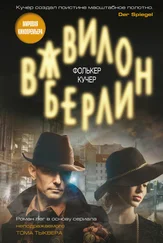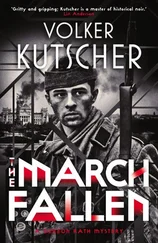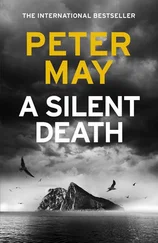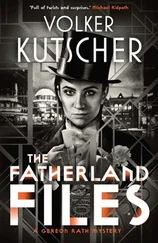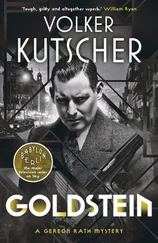‘One way or another we’d have to answer all those questions,’ Böhm objected, ‘whether the whole thing has been staged, as you believe it has, or not.’
‘Then we are in agreement, Böhm,’ Gennat said.
‘At any rate, he treats his victims better once they’re dead,’ Rath said. He was thinking out loud, but Buddha listened attentively all the same. ‘To me it looks like he loves and hates them in equal measure.’
Gennat nodded his agreement. ‘Let’s leave the cinema killings to one side for a moment,’ he said at last, ‘and turn our attention to the Winter case. You both have ground to make up there. If you had collaborated more effectively with one another, gentlemen – and I don’t want to hear any excuses, from either of you – then perhaps we would have made more progress.’ He took a carefully folded piece of paper from his jacket.
‘The search order for the offices of La Belle Film and Heinrich Bellmann’s private quarters,’ he said, waving the paper. ‘I’d like you to lead the operation jointly. You’ll head out there today, I’ve placed a squad of duty officers at the ready.’
Rath and Böhm were both taken equally by surprise and looked at each other in horror. They had to resolve their differences. Buddha had spoken. There was no getting around it.
They couldn’t even work separately. Heinrich Bellmann’s offices and private quarters were housed at the same address, which was typical of Bellmann. It was just another way of saving money – dispensing with the representative office in Kantstrasse and residing in Pistoriusstrasse, where the rents weren’t nearly so high.
The cars rolled up at five on the dot, an Opel containing the CID officers, with Böhm in front next to the driver, Assistant Detective Mertens, and Rath in the rear next to Gräf, whom Gennat had also forced to take part despite being on late shift in the Castle. A police van of squad officers followed, and a pick-up truck to stow the confiscated articles.
Bellmann lived in a solidly middle-class tenement flat in the front building, while the La Belle office was located in the first rear building. A discreet brass plate pointed the way to a kind of studio with large windows that looked as if it had been built for a sculptor who needed a lot of space. Now it was home to desks and a conference table, everything more untidy, old-fashioned and thrown together than in Oppenberg’s uncluttered modern office in Kantstrasse.
Rath left it to the higher-ranking Böhm to dangle the search order in front of the astounded producer’s face. Bellmann was soon on the telephone to the lawyer he so enjoyed threatening people with, probably the same one who had earned him a load of money in his running battle with Manfred Oppenberg. Barely quarter of an hour later the lawyer arrived, but there was nothing he could do except watch as the officers packed files and reels of film into crates and carried them outside. Time and time again Bellmann protested that if the Liebesgewitter premiere had to be postponed he would be holding Böhm and Rath directly responsible, but the protests were half-hearted. For some reason Bellmann’s mind seemed to be elsewhere.
In his years of service, Rath had developed an instinct for house searches. He had learned to read the guilty consciences of people who protested about their four walls being turned upside down, and could distinguish genuine anger from feigned outrage. Bellmann had something to hide, that much was clear. Rath and Böhm took care that no one disposed of anything secretly.
There was a great deal to pack up, mainly document files, and he felt like he was part of a tax investigation. In his private residence, Bellmann had a little study from which they seized all papers and files, as well a few old appointments diaries, notebooks and screenplays. Next to the study was a small projection room, and Rath instructed that all film cans be secured, including the reel that was still in the projector.
They were almost finished when a woman in a grey winter coat swept through the front door, looking around frantically until she recognised Rath. ‘What’s going on here?’ Cora Bellmann asked.
‘House search,’ Rath said. ‘DCI Böhm has the warrant.’ He gestured towards the adjoining room where Böhm was currently signing a list of confiscated articles for the lawyer.
‘If anything important should go missing,’ Bellmann cursed as he scanned the inventory, ‘or your people should have broken anything, then…’
‘…then the Free State of Prussia will naturally reimburse you for the damage,’ Böhm interrupted. ‘This is a summons. Please make sure you present yourself at police headquarters tomorrow morning at ten.’
‘You’ve a nerve! I’ve got an important meeting tomorrow at ten.’
‘You’ll have to postpone.’
Cora Bellmann cut in. ‘What is the meaning of this?’ she asked first her father, who shrugged his shoulders, then Böhm. ‘Can you explain to me why you are treating my father like a criminal?’
‘If we were treating your father like a criminal he’d be in handcuffs and heading for a night in the cells,’ Böhm said.
‘We don’t have to stand for this!’
‘Actually you do.’ Böhm remained calm. ‘You may accompany your father to the station tomorrow morning should you wish, Fräulein Bellmann. Any questions you have will be answered there. Now you must excuse me. Our work here is done.’
Böhm lifted his hat and pushed his way outside. Emerging through the door he gave Rath a wink before cocking his head to one side, a gesture that could only mean one thing: let’s get out of here!
Gräf and Mertens stayed behind to shadow the producer, ‘…but conspicuously, so that he notices,’ as Gennat had said. Thus the Opel stayed where it was, and Rath and Böhm were obliged to head back to the Castle in the pick-up, squashed beside each other on the front seat next to the driver. The return journey was a little rough in places, and the pair were shaken around so much that there was no way they could avoid bumping into one another.
Böhm maintained an icy silence, as he had on the journey out. The driver sensed the tension and said nothing. The man was far too easy to offend, Rath thought. If they had to work together then they should at least try to make the best of it. He decided to give it a whirl.
‘I know I acted improperly the day before yesterday when I set the whole disused cinema business in motion,’ he said. ‘Lange had told me expressly that it was against your wishes.’
Böhm continued to stare at the Greifswalder Strasse evening traffic, saying nothing.
‘I’m sorry,’ Rath said. ‘I thought the idea was right and wanted to put it into action. If I’ve offended you by doing so, then I’d like to apologise.’
‘It’s fine,’ Böhm growled. ‘The fact it was successful proves you made the right choice.’ He turned his head and looked Rath sternly in the eye. ‘But if you should disregard a single one of my orders today, even if all you do is refuse to make coffee, I’ll slap a disciplinary hearing on your arse so hard you won’t be able to recover from it. Is that understood?’
‘Understood.’
Despite the serious threat, Rath couldn’t help but grin. The atmosphere in the car was suddenly more relaxed. The driver sensed it too, and was noticeably calmer behind the wheel.
When they arrived at Alex, only the late shift was still on duty in Homicide. Henning, who had to step in for Gräf, and Lange, as well as a little black dog. Kirie jumped up as Rath came through the door.
‘What’s the dog doing here?’ Böhm asked.
‘Fräulein Voss brought her just now,’ Henning said. ‘For Inspector Rath, she said.’
‘I’m looking after her,’ Rath explained. ‘She belonged to Jeanette Fastré, the poor thing.’
Читать дальше
